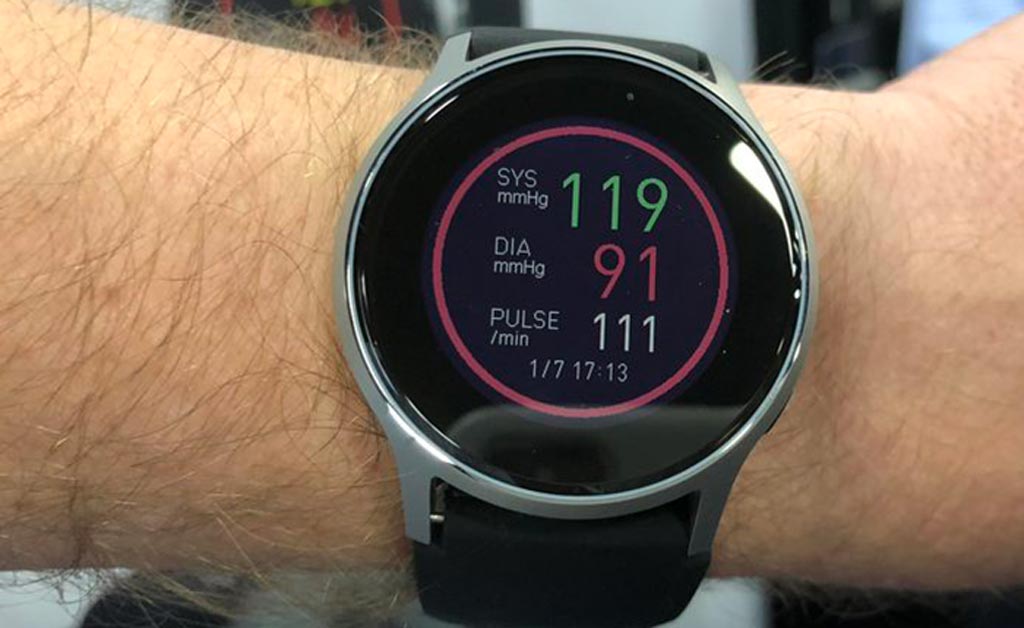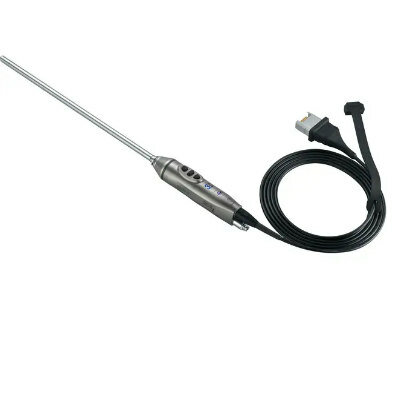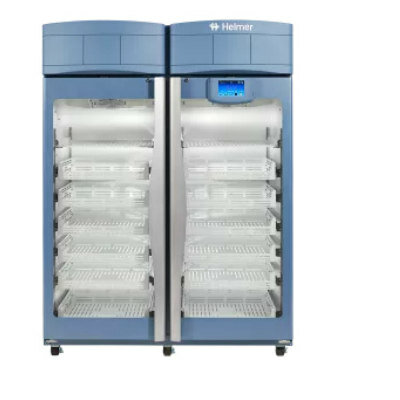Oscillometric Smartwatch Monitors Blood Pressure Continuously
|
By HospiMedica International staff writers Posted on 01 Jan 2019 |

Image: A new wristwatch accurately measures blood pressure and pulse (Photo courtesy of Omron).
An innovative wristwatch with an inflatable cuff built directly into the band measures blood pressure (BP) at the wrist.
The Omron Healthcare (Kyoto, Japan) HeartGuide wristwatch is based on oscillometric measurement--the inflation of a cuff to measure systolic and diastolic pressure--at the wrist using patented, miniaturized components, some no larger than a grain of rice, including inflation pumps, valves, and semiconductor chips. The watchband itself is made of a flexible synthetic material, five times stronger than steel, which was developed for the airbags of the National Aeronautics and Space Administration (NASA; Houston, USA) Mars Lander.
The strong, yet flexible, material allows the band to inflate to take a BP reading while withstanding air pressure and maintaining its shape to ensure accurate measurement. In addition, the device measures daily activity, heart rate and sleep quality, and can be programmed to take a BP reading during sleep. A single charge is sufficient for between 30 and 50 inflations, meaning that the watch should only need recharging once or twice a week. HeartGuide comes in three sizes (S, M, and L) to ensure accuracy and provide better fit and comfort.
HeartGuide is linked to the Omron Connect App, which allows users to store, track, and share their heart health data with their doctors for deeper heart health insights. Connect App can store a range of data collected including BP and heart rate. An easy-to-navigate, user-friendly interface features an intuitive dashboard that conveniently charts and graphs data--viewable by day, week, month, or year--making it easy for users to keep close watch on heart health trends.
“The wearable HeartGuide tracks sleep quality, and can be programmed to take a blood pressure reading while you sleep,” said Ranndy Kellogg, president and CEO of Omron Healthcare. “Heart attack risk is higher in the last phase of sleep and in the morning. Checking blood pressure during sleep is an important option for hypertensive patients and an advancement in our pursuit of Going for Zero, the elimination of heart attack and stroke.”
“Too many people their blood pressure is nothing more than two numbers - 140 over 90 or whatever - there’s no meaning to it. We’re trying to give meaning to it,” said Jeff Ray, executive director of business and tech at Omron. “We can really start looking at the predictive world. As we start looking at creating your own personal baseline of health, where someone needs to worry about is when they deviate from the baseline. The day may not be too far off when we can tell people days and weeks before that a heart attack or stroke is imminent.”
The Omron Healthcare (Kyoto, Japan) HeartGuide wristwatch is based on oscillometric measurement--the inflation of a cuff to measure systolic and diastolic pressure--at the wrist using patented, miniaturized components, some no larger than a grain of rice, including inflation pumps, valves, and semiconductor chips. The watchband itself is made of a flexible synthetic material, five times stronger than steel, which was developed for the airbags of the National Aeronautics and Space Administration (NASA; Houston, USA) Mars Lander.
The strong, yet flexible, material allows the band to inflate to take a BP reading while withstanding air pressure and maintaining its shape to ensure accurate measurement. In addition, the device measures daily activity, heart rate and sleep quality, and can be programmed to take a BP reading during sleep. A single charge is sufficient for between 30 and 50 inflations, meaning that the watch should only need recharging once or twice a week. HeartGuide comes in three sizes (S, M, and L) to ensure accuracy and provide better fit and comfort.
HeartGuide is linked to the Omron Connect App, which allows users to store, track, and share their heart health data with their doctors for deeper heart health insights. Connect App can store a range of data collected including BP and heart rate. An easy-to-navigate, user-friendly interface features an intuitive dashboard that conveniently charts and graphs data--viewable by day, week, month, or year--making it easy for users to keep close watch on heart health trends.
“The wearable HeartGuide tracks sleep quality, and can be programmed to take a blood pressure reading while you sleep,” said Ranndy Kellogg, president and CEO of Omron Healthcare. “Heart attack risk is higher in the last phase of sleep and in the morning. Checking blood pressure during sleep is an important option for hypertensive patients and an advancement in our pursuit of Going for Zero, the elimination of heart attack and stroke.”
“Too many people their blood pressure is nothing more than two numbers - 140 over 90 or whatever - there’s no meaning to it. We’re trying to give meaning to it,” said Jeff Ray, executive director of business and tech at Omron. “We can really start looking at the predictive world. As we start looking at creating your own personal baseline of health, where someone needs to worry about is when they deviate from the baseline. The day may not be too far off when we can tell people days and weeks before that a heart attack or stroke is imminent.”
Latest Health IT News
- Printable Molecule-Selective Nanoparticles Enable Mass Production of Wearable Biosensors
- Smartwatches Could Detect Congestive Heart Failure
- Versatile Smart Patch Combines Health Monitoring and Drug Delivery
- Machine Learning Model Improves Mortality Risk Prediction for Cardiac Surgery Patients
- Strategic Collaboration to Develop and Integrate Generative AI into Healthcare
- AI-Enabled Operating Rooms Solution Helps Hospitals Maximize Utilization and Unlock Capacity
- AI Predicts Pancreatic Cancer Three Years before Diagnosis from Patients’ Medical Records
- First Fully Autonomous Generative AI Personalized Medical Authorizations System Reduces Care Delay
- Electronic Health Records May Be Key to Improving Patient Care, Study Finds
- AI Trained for Specific Vocal Biomarkers Could Accurately Predict Coronary Artery Disease
Channels
Critical Care
view channel
Ingestible Smart Capsule for Chemical Sensing in the Gut Moves Closer to Market
Intestinal gases are associated with several health conditions, including colon cancer, irritable bowel syndrome, and inflammatory bowel disease, and they have the potential to serve as crucial biomarkers... Read moreNovel Cannula Delivery System Enables Targeted Delivery of Imaging Agents and Drugs
Multiphoton microscopy has become an invaluable tool in neuroscience, allowing researchers to observe brain activity in real time with high-resolution imaging. A crucial aspect of many multiphoton microscopy... Read more
Novel Intrabronchial Method Delivers Cell Therapies in Critically Ill Patients on External Lung Support
Until now, administering cell therapies to patients on extracorporeal membrane oxygenation (ECMO)—a life-support system typically used for severe lung failure—has been nearly impossible.... Read moreSurgical Techniques
view channel
Pioneering Sutureless Coronary Bypass Technology to Eliminate Open-Chest Procedures
In patients with coronary artery disease, certain blood vessels may be narrowed or blocked, requiring a stent or a bypass (also known as diversion) to restore blood flow to the heart. Bypass surgeries... Read more
Intravascular Imaging for Guiding Stent Implantation Ensures Safer Stenting Procedures
Patients diagnosed with coronary artery disease, which is caused by plaque accumulation within the arteries leading to chest pain, shortness of breath, and potential heart attacks, frequently undergo percutaneous... Read more
World's First AI Surgical Guidance Platform Allows Surgeons to Measure Success in Real-Time
Surgeons have always faced challenges in measuring their progress toward surgical goals during procedures. Traditionally, obtaining measurements required stepping out of the sterile environment to perform... Read morePatient Care
view channel
Portable Biosensor Platform to Reduce Hospital-Acquired Infections
Approximately 4 million patients in the European Union acquire healthcare-associated infections (HAIs) or nosocomial infections each year, with around 37,000 deaths directly resulting from these infections,... Read moreFirst-Of-Its-Kind Portable Germicidal Light Technology Disinfects High-Touch Clinical Surfaces in Seconds
Reducing healthcare-acquired infections (HAIs) remains a pressing issue within global healthcare systems. In the United States alone, 1.7 million patients contract HAIs annually, leading to approximately... Read more
Surgical Capacity Optimization Solution Helps Hospitals Boost OR Utilization
An innovative solution has the capability to transform surgical capacity utilization by targeting the root cause of surgical block time inefficiencies. Fujitsu Limited’s (Tokyo, Japan) Surgical Capacity... Read more
Game-Changing Innovation in Surgical Instrument Sterilization Significantly Improves OR Throughput
A groundbreaking innovation enables hospitals to significantly improve instrument processing time and throughput in operating rooms (ORs) and sterile processing departments. Turbett Surgical, Inc.... Read moreBusiness
view channel
Expanded Collaboration to Transform OR Technology Through AI and Automation
The expansion of an existing collaboration between three leading companies aims to develop artificial intelligence (AI)-driven solutions for smart operating rooms with sophisticated monitoring and automation.... Read more















